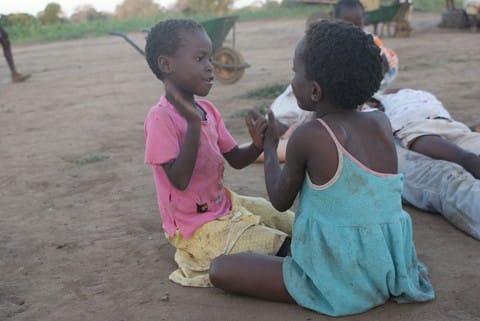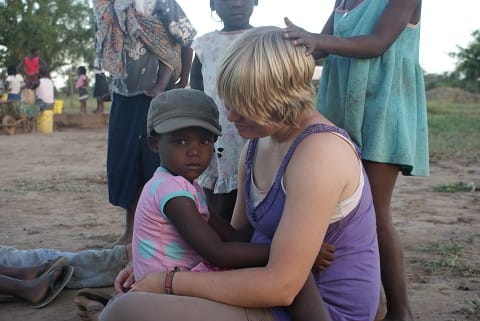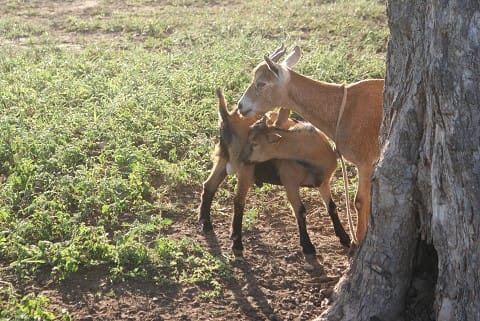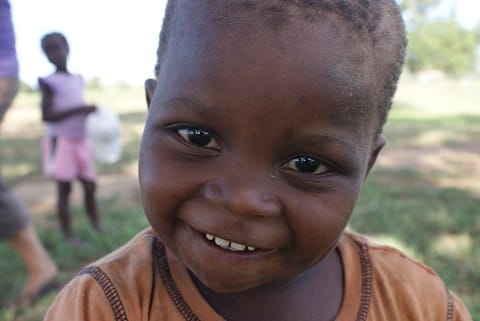days, and this blog is about my observations and our time there. It
is jumbled and not put together very coherently; however, enjoy!
shouts and laughter, dogs barking, kids saying “Hello” as they
pump water from the well in the dark, chirps from insects all around
dwelling in the grass, and faintly, the rustle of leaves as a breeze
gently moves the air, refreshing our hot bodies lying sprawled in our
tents waiting for exhaustion to overcome us and sleep to take control
of ourselves until we next wake up to toss and turn to find a more
comfortable position and slap a bug that may or may not exist until
morning finally announces itself with the rising of the sun.
in Guija. Sorry it’s basically a long, run-on sentence; I
was simply writing.
 The kids surrounding the well are poor. This is evident
The kids surrounding the well are poor. This is evidentin the light-colored dirt streaking their dark skin and the holes in
their clothes. I didn’t mind picking up a kid, even if he/she was
extremely dirty. They seemed to mind, though. Whenever dirt appeared
on my clothing or skin as a result of the kid I was holding, they
would scold that kid for getting me dirty and try to brush the dirt
off my clothing.

they thought I would become angry with them or thought it odd that a
white person should be as dirty as them. There could be other
explanations, though, that I would not think of because I have never
lived in poverty and have a different mindset. I don’t really have an
answer to my question.
his 3-member team of local Christ-followers, walked on the dusty
paths through the community, while the scent of alcohol assaulted our
nostrils, to visit the sick and the elderly. Many of the sick were
“on the program” as Tenny, our contact, said in reference to them
having HIV/AIDS since it is still not an acceptable disease there.

poorly-constructed shacks by themselves because all or most of their
family members had a
 lready died. Their main source of food came from
lready died. Their main source of food came fromtheir own crops, which were hard to maintain due to their aging and
deteriorating bodies. Because of this, most rely solely on rainwater
for the plants as the well is too far away for them to walk, and most
cannot shoo the animals grazing in their fields; they can only
helplessly watch their food source dwindle.
us with a warm smile and a friendly handshake.
malnutrition, as we learned on our visit. When we walked into
the woman’s ward, three scrawny, elderly ladies sat up in bed and
hurriedly tried to look decent for visitors. With the help of
Silverton, our translator, we discovered that each lady had been
admitted because of symptoms accompanying malnutrition, such as
swollen legs, diarrhea, etc. After praying for them, we moved on to
the baby ward.
and mamas were sitting in the hallway with babies and kids in tow. So skinny and small were the babies. Many had
light-colored hair, which meant they were suffering from
malnutrition. Seeing such precious life suffering and sick made my
heart swell with compassion for them and their mamas. All I could do
was pray for healing and trust God to work out all things for good,
like He promises.
“And we know that for those who love God all things
work together for good…”










oh, sweetie, how hard it must be to see the poverty and not being able to do much about it! But, you are making a difference just by being there & reaching out, loving them, holding them, praying for them. God can & does work mightily through willing hands. Thank you for being there!
awesome! I don’t feel like we talked about Mozambique while we were there, this helped!